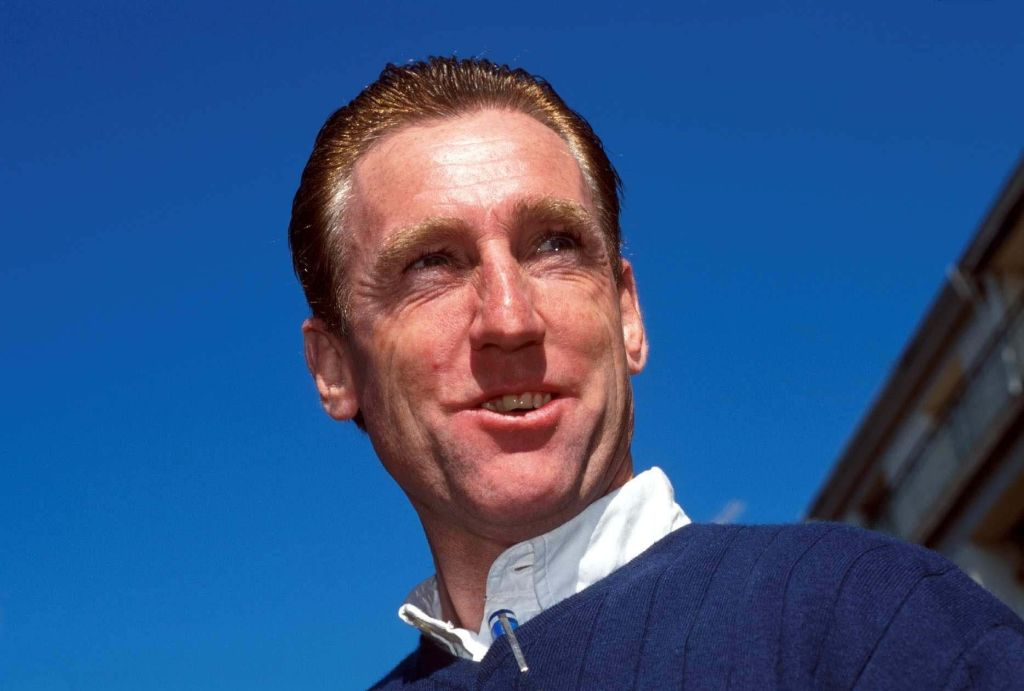Sean Kelly's Classics Column: Only a mistake cost Tadej Pogačar in Paris-Roubaix – he'll be back to win soon
The nine-time Monument winner reflects on Van der Poel's win, a costly mistake from Pogačar, and what Ferrand-Prévot's win means for the rest of the season
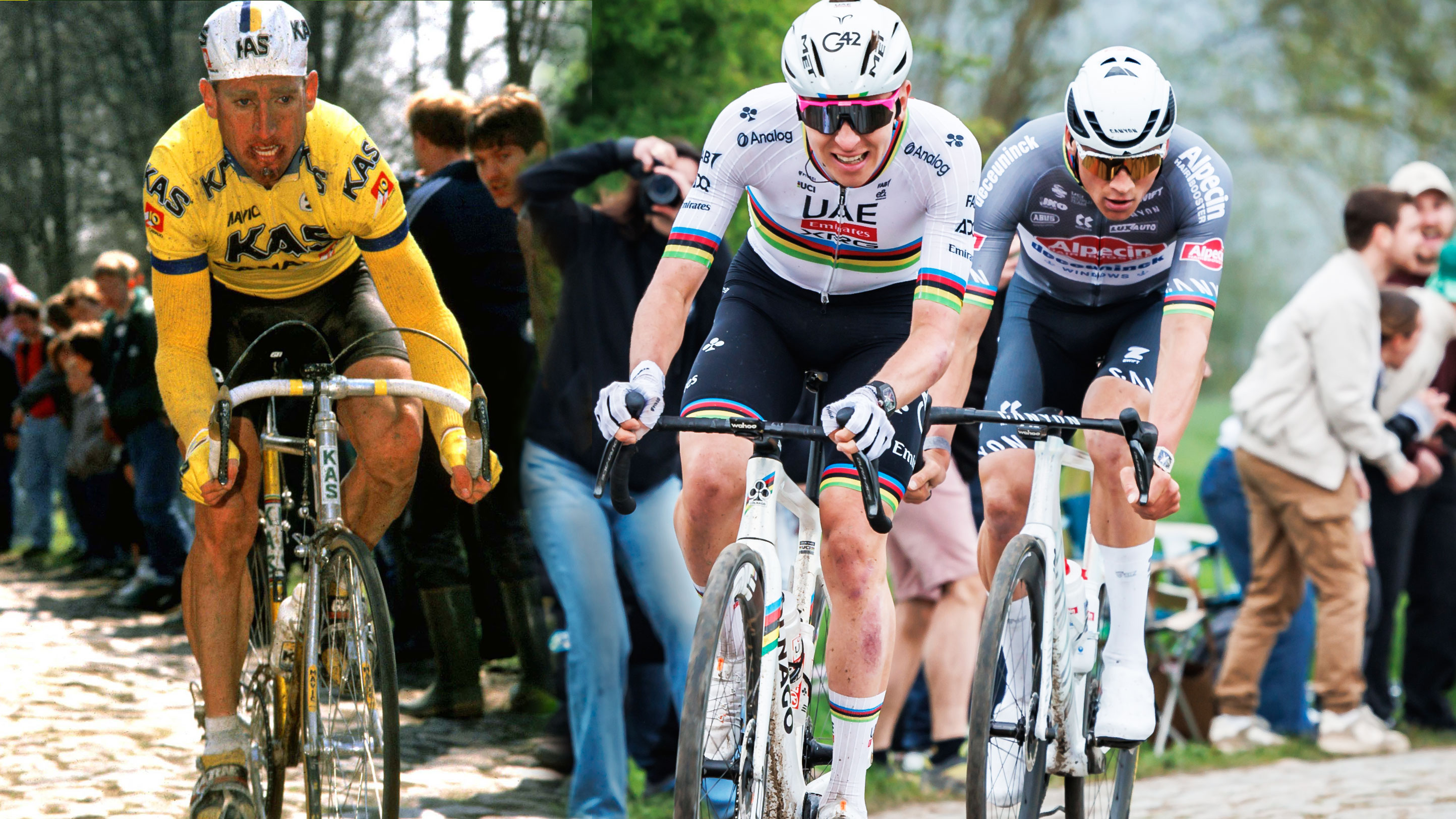
So much happened in the 2025 edition of Paris-Roubaix, but the biggest one was undoubtedly Tadej Pogačar's mistake and crash. Without it, I think he could have won because Mathieu van der Poel's mechanical proved that anything could still happen.
Of course, it was always going to be hard for Pogačar to beat Van der Poel in that one-on-one situation because he would have had to have shaken him off before the sprint in the velodrome. Still, if Pogačar had been there when Van der Poel had his mechanical, he would have won the race. The world champion would have dug deep and got into time trial mode, and when you're out front in Roubaix, even if you're dying, you can still pull something out.
Unfortunately, though, Pogačar made that big mistake that cost him the race, and it was a big, big error, especially against a guy like Van der Poel who's so good at bike handling that he could probably ride around a corner like that on ice. It's just the type of racer that Pogačar is, though – he's not afraid to try things, whether that's attacking 70km out or taking a risk on a corner. But this time, he got caught out, and maybe if he'd just followed Van der Poel or been more cautious on the cobbles, it would have been different. That's what I'd have told him to do if I were his director, rather than taking risks in difficult places.
In general, though, I was very impressed by his performance, and the way the race played out suited him because it was so hard and full-on from so far out. He was also getting around the cobbles really well, which was very impressive for his first Roubaix – I didn't think he'd be that good, and the way things were strung out early definitely helped him, but he rode really well.
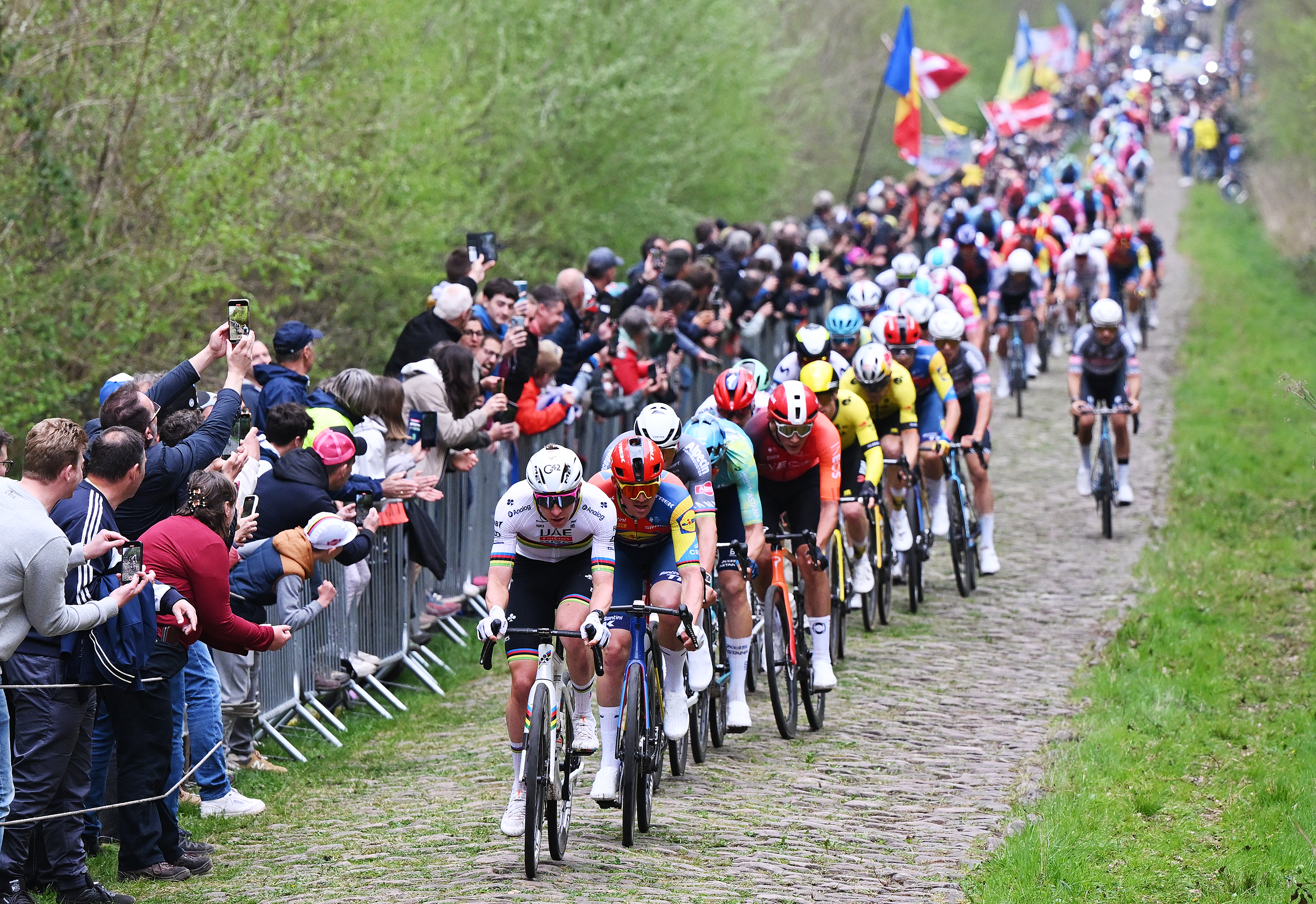
Pogačar leas the peloton through the Trouée d'Arenberg
There were some strange moments, like when he called the car up before a sector, which wouldn't usually be allowed unless you have a mechanical, but the commissaire allowed the car to come up. Pogačar took a bottle, and I did wonder 'What kind of magic bottle is this?' because if you're getting a hunger knock, anything you can take on is still going to take 10 or 15 minutes to get into the system.
So that made me think maybe it was a tactical thing, to call the car up to then make sure the car was near the front of the convoy on the next cobbled sector, which is a small but important advantage. So I'm still wondering about that, and I'm surprised it was allowed to happen.
To me, the signs say that Pogačar can definitely win Paris-Roubaix. The conditions will be important – Sunday wasn't a bad Roubaix, there was some mud but it was quite dry in the end – so if we get dry conditions again, Pogačar is going to win Roubaix in the next couple of years, and I'll be very surprised if he's not back next year.
Skillful Van der Poel made his own luck
Mathieu van der Poel showed again on Sunday that he's just a master in so many different ways. Bike handling, cornering, giving himself space – all these little things conserve a little bit of energy which you then save for later in the day, and we saw how he was able to dig in and take advantage after Pogačar's crash, which is what he needed to do to win.
He also keeps having good luck in these races, he doesn't crash and he doesn't get caught behind crashes, but in Roubaix, you do make your own luck, and it's his ability to read the race, foresee incidents and handle his bike so well that means he avoids crashes and punctures, which is maybe was Pogačar is lacking.
Even with punctures, it's not just luck, often they're because riders are on the limit and riding slightly the wrong line into a hole, or maybe you have another issue because the pressure is on and you ride on the wrong side of the cobbles, but this doesn't happen to Van der Poel. When he's on the limit, really suffering, and going at top speed, he can still read the road and the race so well that he just doesn't make mistakes.
The only strange thing with Van der Poel was how Alpecin-Deceuninck played the tactics when it was him and Jasper Philipsen against Pogačar in the front. With 50 kilometres to go, we saw Van der Poel attacking when Philipsen was with him. It was two vs one against Pogačar, with a gap that was sufficient to the group behind, so I had to ask myself 'Why did Van der Poel attack?' I found it very strange. It would be better to keep on riding with two men from the same team up front, because then if one of you does have a mechanical issue, the other can sit on towards the finish.
So I think Van der Poel actually was trying to use that as an opportunity to get rid of Philipsen because he saw him as potentially a threat. If Philipsen had got rid of that little bit of uphill, and the Carrefour de l'Arbre – which he's ridden well before – he might have been able to go a long way to the finish, so maybe Van der Poel was thinking he had to get rid of him. Yes, they're teammates, but it wouldn't be the first time we've seen that happen within a team.
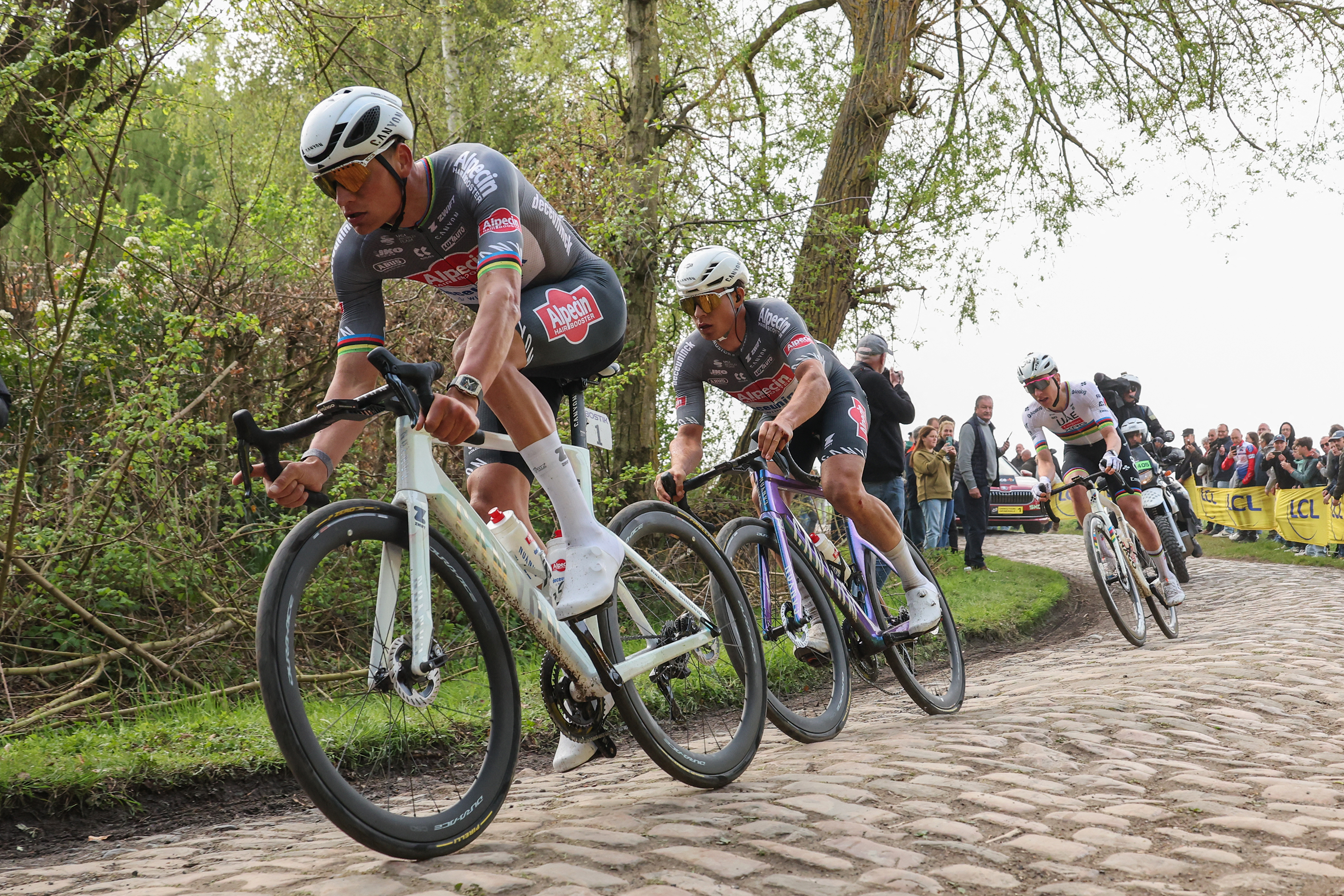
Van der Poel with Philipsen on his wheel
Even with Pogačar's Flanders win and his strong ride in Roubaix, I still think Van der Poel is the best rider in these early season Classics. Pogačar's ability to combine the Classics with the Tour is impressive in its own way, but Van der Poel is the man of the spring this year.
He's the real specialist in these races, and he comes back year on year and keeps winning, and it's not surprising – he's at his prime, he's made for these races, and he has all the ingredients to keep winning them. He's really at his best.
The best of the rest didn't get to shine
As we maybe expected, the race came down to a Pogačar vs Van der Poel duel, but Mads Pedersen was almost there. When he had his puncture, it was a real disaster time for that to happen, and he's been looking really impressive before that. Right from the first sector, he was the one who was pushing on a lot, and I did think 'Is he going to pay for this?' but sadly it was the puncture that took him out.
If that hadn't happened, and he'd been there with Pogačar and Van der Poel, maybe Pedersen would have attacked and they'd look at each other, but unfortunately we didn't get the chance to see that in real life and how he might have performed.
Wout van Aert was apparently caught behind a crash, and then he had a flat, so he got into difficult situations and had to make a lot of efforts to get back into it. He finished strong, but he seems to lack the real high end intensity, so when the race is really on, he's just not at the level. This can happen later in your career, where you still have that stamina but just not the explosiveness in the key moments, so he's still got good shape, but just not what you need to compete for the win in the Spring Classics.
This is where Van der Poel and Pogačar have the advantage, because they just ride trouble-free, they're on top of things, they're in the right position, they're out of danger, and they just get through everything with no hold-ups and no wasted energy, which is a huge plus for the final.
It may only have been race incidents that kept the other favourites out of the final on Sunday, but any idea anyone else has of having a better chance in the Ardennes is non-existent. Pogačar won't be tired after his exploits in Flanders and Roubaix – it's his ability to recover that makes him such a strong Grand Tour rider, so he'll have no issue here.
With the Ardennes, he's returning to the terrain that suits him best, and he's going to be uncontrollable. He's going to give a real demonstration. Amstel Gold Race or Flèche Wallonne might be a bit too easy for him to show how strong he is, but once we get to Liège-Bastogne-Liège, who can beat him? I don't see anybody doing that.
Ferrand-Prévot was exceptional, but the Tour de France is a different beast
In the women's race, Pauline Ferrand-Prévot impressed me again. Her comeback season has been going exceptionally well so far. I didn't expect her to be at this level again so quickly, because the women's peloton has changed so much and I thought it would take some time to get used to, but she's been in the action all year.
She really took the bull by the horns with her attack, rather than just letting SD Worx-Protime control the race. When she went on that attack, I was saying 'this is going to be a difficult one to hold on to' but then there was a bit of a lull and she got 20 seconds. It wasn't just the timing, though, because then the way she rode in the final, and the speed she was going at, I was majorly impressed.
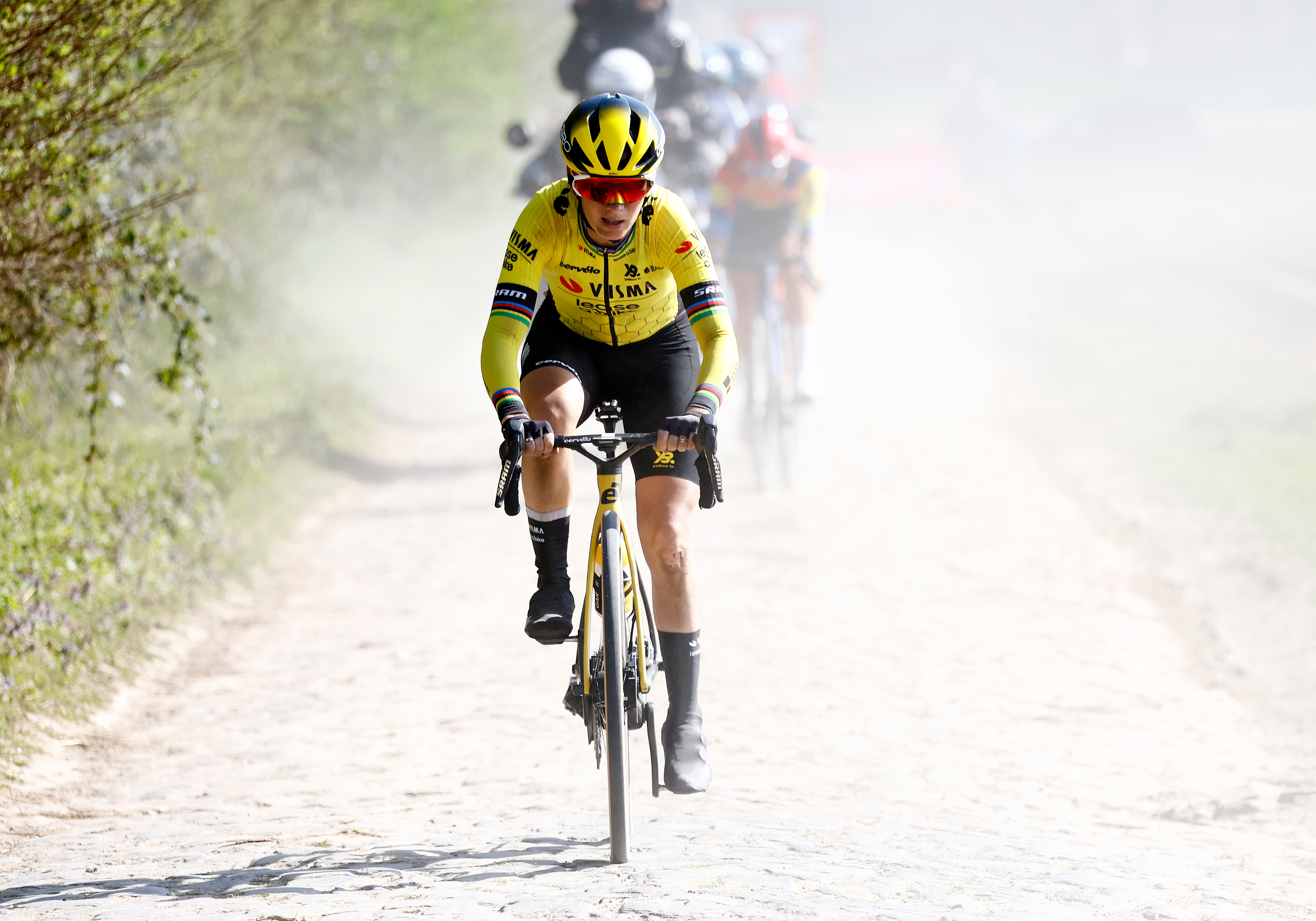
Ferrand-Prévot leaving Emma Norsgaard behind on the way to victory
She's said already and she repeated after the race that her goal is to win the Tour de France Femmes in the next three years, but that's a whole different level – she's clearly motivated, and this win will give her a lot of confidence, but it's another one or two steps up to be good at the Tour.
What you can see is that she's very good at riding in the group and positioning, something which even riders more experienced than her struggle with, so that's excellent. But the question is how she will deal with the big, long climbs, and how she will fare against her rivals after multiple days of racing. It's looking majorly impressive so far, though, and I wouldn't be surprised if she was up there in the Tour already this year. I'm really looking forward to seeing how she goes in those stage races and in the mountains.
Subscribe to Cyclingnews for unlimited access to our 2025 Spring Classics coverage. Don't miss any of the breaking news, reports, and analysis from all the Cobbled Classics from Opening Weekend to Paris-Roubaix. Find out more
"King Kelly", the greatest Irish cyclist to have graced the peloton, brought the Emerald Isle to the fore alongside compatriot Stephen Roche in the 1980s. Points winner at the Tour de France four times, GC in the 1988 Vuelta, and a record-breaking seven consecutive wins at Paris-Nice feature during his glittering career – alongside double victories at Paris-Roubaix, Milan-San Remo and Liège-Bastogne-Liège.
